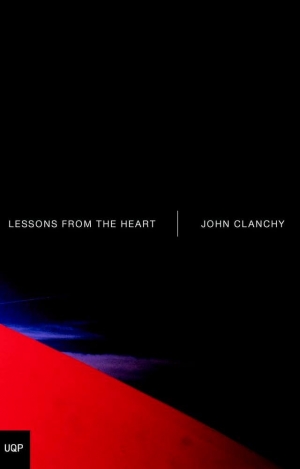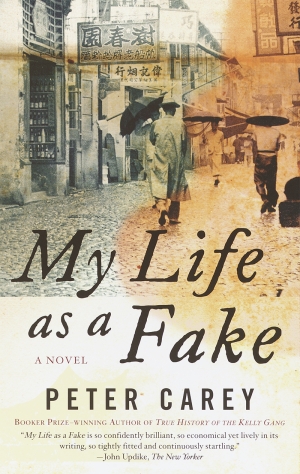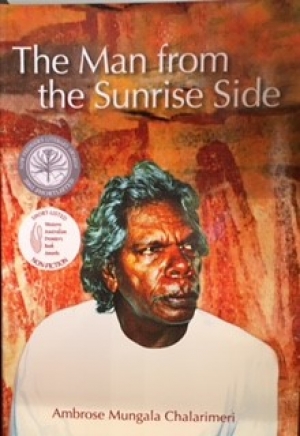Australian Fiction
Michael McGirr reviews ‘Lessons from the Heart’ by John Clanchy
John Clancy does a number of curious things in his new novel. One of them is to put Patrick White’s Voss into the hands of his heroine. Laura is in Year 12. Her teacher, Miss Temple, happens to find a copy of Voss when they are together on a school excursion to Alice Springs. Laura immediately warms to the book. She is a remarkable young woman, sensitive and resourceful. Destined to study medicine, she has literary gifts as well. People offer her jobs at places where others her age are queuing for work. One of her reasons for going on the school excursion, where she helps supervise a group of Year 7 and 8 children, is that she is recovering from the termination of her relationship with Patrick, her slightly older beau.
... (read more)José Borghino reviews ‘Three Dog Night’ by Peter Goldsworthy
It is difficult for non-Aboriginal novelists to deal adequately with Aboriginal experience in their work. There are many reasons for this, not the least of which is general ignorance about Aboriginal experience. But another, more insidious, reason is self-censorship. The politics of speaking in an Aboriginal voice, if you’re not Aboriginal, is at best fraught and at worst a nightmare. Thinking twice before embarking on such an ‘adventure’ is no bad thing, a counter-balance, perhaps, to the days when it was all too easy to usurp an indigenous point of view, days of racist triumphalism or paternalist do-goodism.
... (read more)Adib Khan’s fourth novel mirrors many of the concerns of his second, Solitude of Illusions (1997). Like Khalid in that novel, Martin Godwin in Homecoming looks back over a life that could have been better lived and a moral trajectory that has long since been deflected by one key event. Martin reflects on what could have been different and is tortured by what he sees as his own hypocrisy and cowardice. These attitudes to the past have repercussions for the future as his relationship with his son, again like Khalid’s, is characterised by guilt and misunderstanding. More broadly – and this is a feature of all Khan’s novels – there is a crucial disconnection between the older generation’s way of doing things and the ways of the next. This structure of present guilt and past actions (and inaction) results in novels that shuttle, sometimes a little awkwardly, between flashbacks and the present.
... (read more)Don Anderson reviews ‘The Outside Story: A novel’ by Sylvia Lawson
Sylvia Lawson is a distinguished cultural critic and essayist. Her award-winning The Archibald Paradox: A Strange Case of Authorship was published in 1983, and her collection of essays, How Simone de Beauvoir Died in Australia, won the 2003 Gleebooks Prize for literary and cultural criticism. In selecting the latter volume among my best books of 2002 for the Sydney Morning Herald, I claimed that it was characterised by ‘complex, spacious, committed, convincing, intellectually riveting speculations and reflections’. Many of these qualities may be found in The Outside Story.
... (read more)Dianne Dempsey reviews 'Thicker than Water' by Lindy Cameron, 'The Castlemain Murders' by Kerry Greenwood and 'The Cutting' by Lee Tulloch
Miss Maude Silver, Miss Jane Marple, where are you, with your splendid and authoritative bosoms, your discreet inquiries, natural reticence, and cunning powers of deduction? Oh, a long way from these sisters in crime.
... (read more)To an outside observer of the Australian literary and cultural scene, the Ern Malley hoax is one of those spin-offs in the Australian experience that keep on conjuring up Mark Twain’s famous dictum of the nature of the country’s history: ‘It does not read like history, but like the most beautiful lies ...
... (read more)After Ned Kelly, the story of Burke and Wills ranks high among Australians’ favourite tales of heroic failure. Simpson and his donkey are on the list, followed closely by any number of stories from the locker rooms of sporting clubs both great and small. There are strict conventions governing the telling of these stories. However pointless, futile, and even bloody they may have been, they are handed down as stories of romance. Kelly, Simpson, and Bradman all had a final stand. The hero, in his final stand, is alone on a pedestal. The other people around at the time are reduced to the role of extras. It’s a pity. Arthur Morris, the man at the other end when Bradman was dismissed for a duck in his final innings, went on to make 196. Nobody much remembers. Joe Byrne, Kelly’s closest ally and confidant, happened to speak Cantonese. An addict, he had picked it up among the opium traders of Beechworth. Byrne’s acquisition of a Chinese language is far more interesting than the dreary question that has been provoked by yet another movie version of the Kelly story – whether or not Ned spoke with an Irish accent.
... (read more)Marion Halligan’s latest novel should be a success. It is a continuation and concentration of themes, characters, and settings that have consistently engaged her in a considerable body of work. The Point is full of Halligan favourites: food, art, love, literature, hubris, Canberra, Séverac, and the Spensers. It is a novel with currency, exploring the IT industry, the business of food, and the perceived distance between those with and those without. Halligan has a reputation as an intense and original writer, but The Point is a disappointing novel.
... (read more)What is the significance of these stories told by apparently unremarkable people? One thread lies in recording times not quite past, but still enduring amidst vast changes. Their common quality is stoicism, an ability to keep going, in the face of monumental shifts, not just the technological ones that we have all faced in the last century, but huge transformations to cultural life.
... (read more)This is a particularly interesting group of reissued ‘classics’, spanning just over fifty years in twentieth-century Australian literature. Although they have very different fictional styles, all are realist or social realist novels, and their politics and preoccupations are not dissimilar. Each is concerned with working people’s lives, differing contrasts between city and country life, and aspects of class.
... (read more)








